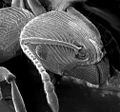Coccolithophore shells Many protists have protective shells or tests, usually made from silica (glass) or calcium carbonate (chalk). Protists are a diverse...
41 KB (3,865 words) - 06:57, 12 July 2025
A protist (/ˈproʊtɪst/ PROH-tist) or protoctist is any eukaryotic organism that is not an animal, land plant, or fungus. Protists do not form a natural...
218 KB (23,274 words) - 06:42, 17 July 2025
The turtle shell is a shield for the ventral and dorsal parts of turtles (the order Testudines), completely enclosing all the turtle's vital organs and...
47 KB (5,050 words) - 21:33, 18 July 2025
Marine protists Marine protists are defined by their habitat as protists that live in marine environments, that is, in the saltwater of seas or oceans...
133 KB (10,605 words) - 07:16, 12 July 2025
Nacre (redirect from Pearl shell)
organic–inorganic composite material produced by some molluscs as an inner shell layer. It is also the material of which pearls are composed. It is strong...
36 KB (3,928 words) - 01:33, 21 July 2025
Diatomaceous earth consists of the fossilized remains of diatoms, a type of hard-shelled microalgae, that have accumulated over millions of years. It is used as...
41 KB (4,410 words) - 19:25, 11 July 2025
(shells) Arthropod exoskeleton cuticle Brachiopod shell Cephalopod shell cirrate shell cuttlebone gladius Lorica Choanoflagellate lorica Protist shell...
21 KB (2,346 words) - 22:58, 23 May 2025
as cuttlefish bone, is a hard, brittle internal structure (an internal shell) found in all members of the family Sepiidae, commonly known as cuttlefish...
16 KB (1,651 words) - 14:58, 26 May 2025
in biological systems, such as the formation of stromatolites or mollusc shells (see Biomineralization). Calcification can manifest itself in many ways...
9 KB (925 words) - 17:59, 17 July 2025
The gastropod shell is part of the body of many gastropods, including snails, a kind of mollusc. The shell is an exoskeleton, which protects from predators...
32 KB (3,898 words) - 21:19, 17 July 2025
Test (biology) (redirect from Test (shell))
In biology, a test is the hard shell of some spherical aquatic animals and protists, notably sea urchins and microorganisms such as testate foraminiferans...
12 KB (1,197 words) - 23:56, 6 July 2025
(shells) Arthropod exoskeleton cuticle Brachiopod shell Cephalopod shell cirrate shell cuttlebone gladius Lorica Choanoflagellate lorica Protist shell...
11 KB (1,256 words) - 02:16, 25 July 2025
another example, many fossil genera of Foraminifera, which are protists are known from shells (called tests) that were as big as coins, such as the genus...
61 KB (6,337 words) - 03:46, 3 July 2025
The mollusc (or mollusk) shell is typically a calcareous exoskeleton which encloses, supports and protects the soft parts of an animal in the phylum Mollusca...
41 KB (4,893 words) - 14:15, 19 May 2025
sea squirts and sea urchins, and the prominent mollusc shell shared by snails, clams, tusk shells, chitons and nautilus. Some vertebrate animals, such as...
18 KB (2,162 words) - 01:53, 26 May 2025
and cuttlefish) have an internalized vestigial aragonite/calcite-chitin shell known as gladius or cuttlebone, which can serve as muscle attachments but...
16 KB (1,824 words) - 20:35, 6 July 2025
class of Rhizarian protists characterized by streaming granular ectoplasm for catching food and other uses; and commonly an external shell (called a "test")...
88 KB (8,564 words) - 17:07, 23 July 2025
Amoeba (redirect from Amebas (pseudopodia protists))
are no longer classified together in one group. The best known amoeboid protists are Chaos carolinense and Amoeba proteus, both of which have been widely...
52 KB (4,939 words) - 01:52, 28 July 2025
(shells) Arthropod exoskeleton cuticle Brachiopod shell Cephalopod shell cirrate shell cuttlebone gladius Lorica Choanoflagellate lorica Protist shell...
14 KB (1,531 words) - 13:04, 28 July 2025
Small shelly fauna (section Minerals used in shells)
shells. These animals may have been molluscs or worm-like Sipuncula. Other molluscan univalved shells have been found in Canada. Some bivalve shells have...
41 KB (4,962 words) - 18:00, 22 May 2025
(shells) Arthropod exoskeleton cuticle Brachiopod shell Cephalopod shell cirrate shell cuttlebone gladius Lorica Choanoflagellate lorica Protist shell...
8 KB (943 words) - 19:49, 4 October 2023
(shells) Arthropod exoskeleton cuticle Brachiopod shell Cephalopod shell cirrate shell cuttlebone gladius Lorica Choanoflagellate lorica Protist shell...
5 KB (487 words) - 02:50, 9 November 2021
Ocean acidification - a threat for marine biogenic calcification Protist shell Seashell Shell growth in estuaries Kawahata, Hodaka; Fujita, Kazuhiko; Iguchi...
64 KB (7,212 words) - 10:30, 23 July 2025
functional biominerals, such as endoskeletons and exoskeletons, protective shells, or teeth, had been a significant step in animal evolution. Calcium carbonate...
72 KB (7,911 words) - 10:30, 11 July 2025
as support, defense, and feeding. Many protists, like this coccolithophore, have protective mineralised shells. Forams from a beach Many invertebrate...
97 KB (10,440 words) - 23:52, 8 June 2025
Coccolithophore (section Coccolithophore shells)
predator to utilise the organic content of coccolithophores. Heterotrophic protists are able to selectively choose prey on the basis of its size or shape and...
90 KB (9,399 words) - 01:44, 14 June 2025
(shells) Arthropod exoskeleton cuticle Brachiopod shell Cephalopod shell cirrate shell cuttlebone gladius Lorica Choanoflagellate lorica Protist shell...
17 KB (1,916 words) - 09:11, 27 May 2025
Testacea or Thecamoeba) are a polyphyletic group of unicellular amoeboid protists, which differ from naked amoebae in the presence of a test that partially...
16 KB (1,237 words) - 01:35, 18 December 2024
predator to utilise the organic content of coccolithophores. Heterotrophic protists are able to selectively choose prey on the basis of its size or shape and...
25 KB (2,535 words) - 16:24, 3 June 2025
























